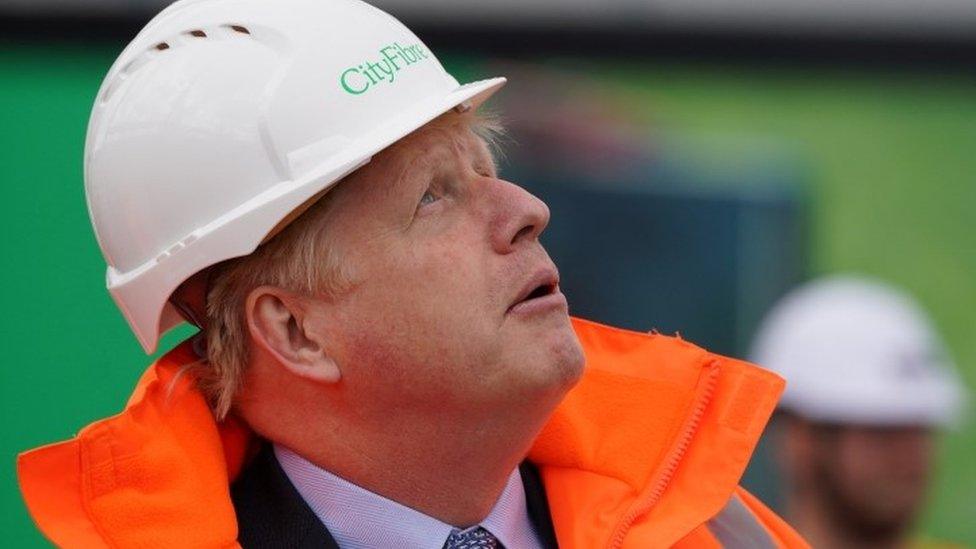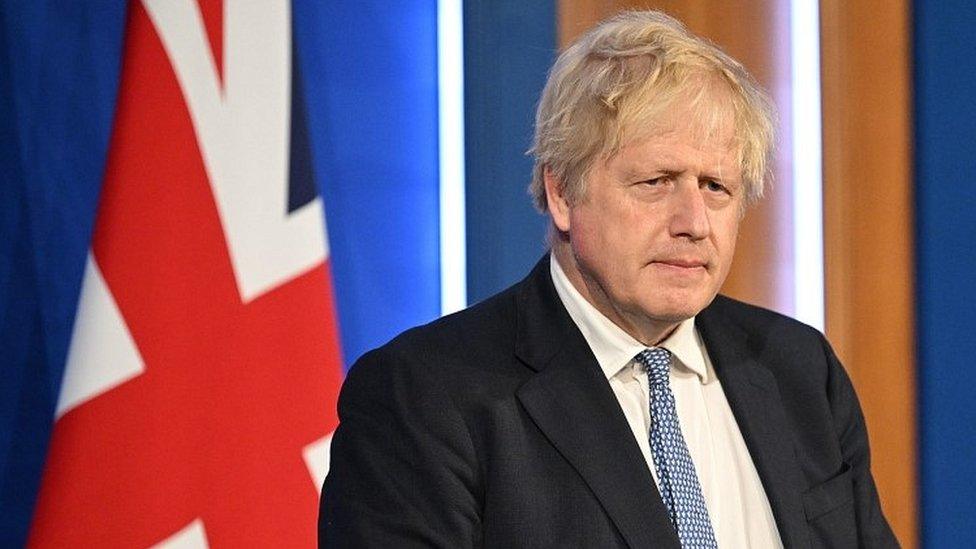Sue Gray report: Two more MPs submit letters of no-confidence in PM
- Published

Boris Johnson visited the CityFibre Training Academy in Stockton-on-Tees on Friday
Two more Tory MPs have revealed they have submitted letters of no confidence in Prime Minister Boris Johnson.
Ex-minister Steve Brine and Anne Marie Morris join the six Tory MPs to call for him to go since the Sue Gray report was published last Wednesday.
Ms Gray's report details widespread rule-breaking in Downing Street during Covid lockdowns.
Overall, the BBC is aware of at least 20 Tory MPs who have submitted letters of no confidence.
This is short of the 54 needed to force a vote on the PM's future. although the actual number of letters could be higher.
Only Sir Graham Brady, chairman of the 1922 Committee of backbenchers, knows the exact number, and he is not expected to say anything until the 54 threshold has been reached.
In a statement to constituents, Winchester MP Brine said he could no longer "defend the indefensible" as "rule makers cannot be rule breakers".
On Friday, MP Paul Holmes quit his government job, saying he was "shocked and appalled" by events at No 10.
Mr Holmes resigned as a parliamentary private secretary - a ministerial aide - to Home Secretary Priti Patel.
He told the BBC he felt "deeply uncomfortable" over the findings in Ms Gray's long-awaited report, which was published this week.
Former junior minister Sir Bob Neill also called on the prime minister to quit over the report and submitted a letter of no confidence.
Sir Bob, the Tory MP for Bromley & Chislehurst, said the report had "highlighted a pattern of wholly unacceptable behaviour".
And another of the 2019 intake of Conservative MPs, Alicia Kearns, issued a statement, reiterating that her position is "unchanged" since January, saying that the prime minister "continues not to hold my confidence".
The MP for Rutland and Melton said she could only conclude that "the prime minister's account of events to Parliament was misleading", adding that the "protracted affair has brought our government and my party into disrepute".
Speaking on BBC Radio 4's Any Questions on Friday, Treasury minister John Glen said the prime minister was in "yellow card territory" but said he would continue to "get on and deliver" as part of the government.
In her report, Ms Gray said many events held during Covid restrictions "should not have been allowed" and the prime minister and his officials "must bear responsibility for this culture".
She also found "multiple examples of a lack of respect and poor treatment" of security staff and cleaners by officials when gatherings took place.
Sir Bob told the BBC he had made his decision to call on Mr Johnson to resign after speaking to constituents, adding he was "not part of any campaign group" to unseat the PM.
He added what had gone on had "eroded trust" in government, and he found Mr Johnson's explanation he was unaware of the nature of parties in No 10 not credible.
"I can't believe he was not aware about at least some of what was going on," he added.
Conservative MP Paul Holmes explains why he is stepping down from his Home Office role.
Eastleigh MP Mr Holmes said his work for constituents had been "tarnished by the toxic culture that seemed to have permeated No 10."
But speaking to BBC South Today, Mr Holmes insisted his resignation was "not about the leadership, this is not about letters or the 1922 committee".
Ms Gray's report follows a four-month Metropolitan Police inquiry that saw 126 fines issued to 83 people - including Mr Johnson, his wife Carrie and Chancellor Rishi Sunak - for events that took place in 2020 and 2021.
Before Mr Holmes announced his resignation, Mr Johnson told reporters he was confident he has enough support within his party to stay in post - but he deflected questions on whether he had tolerated the culture of heavy drinking and rule-breaking highlighted by Ms Gray's report.
"If you look at the answers in the House of Commons over more than two hours, I think you'll be able to see I answered that very, very extensively," said the PM.
Watch: Ros Atkins on… The Sue Gray report
Elected as MP at the 2019 general election, Mr Holmes has been a parliamentary private secretary to Ms Patel since September 2021.
The unpaid role is the bottom rung of the government ladder, and is often seen as a way for newer MPs to gain experience of working with ministers.
His resignation - announced in a statement, external - made him the second Tory to have left a government post over the Partygate saga.
In April, Lord David Wolfson quit as a justice minister, saying the "scale, context and nature" of Covid breaches in government was inconsistent with his responsibility to uphold the rule of law.
- Published25 May 2022
